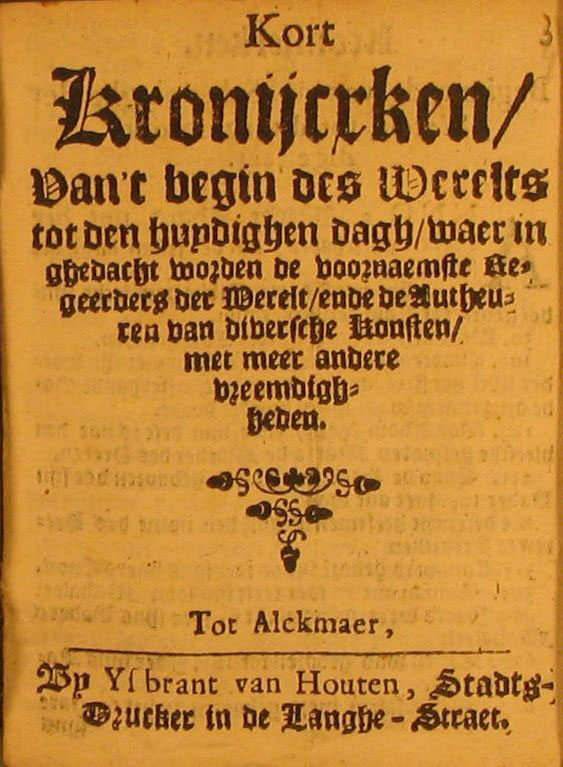Glossary
Chronicle/Chronology

Other languages
- Dutch: kroniek
- German: Chronik
- French: chronique
- Italian: cronologia, cronica, cronaca
- Polish: kronika
- Spanish: crónica
Material form
Printed bookSubject
Narrative literature and historyDescription
Overview of events described in chronological order, often starting from Creation until the most recent times. Part of these events were biblical or classical, others were related to more recent European or national (sometimes even regional) history. While they tend to claim historical accuracy, they could serve as political instruments (or at least reflect certain political or religious predilections) through the ways in which the chroniclers selected and presented events from the past.
Many printed chronicles were large, illustrated volumes that do not qualify as ‘cheap’ but that might be considered ‘popular’ because of the many editions in which they appeared. Chronicles could also be incorporated or added to almanacs, as happened in England, the Dutch Republic, and Italy, and thus come within reach of a larger and less well-to-do audience. Certain news genres, notably mercuries and newsbooks, combine characteristics of news and chronicles as they include events from the recent past, e.g. published semi-annually.
In Spain, the heyday of printed chronicles was the 15th-16th century, whereas the genre virtually disappeared in the 17th century.
Related terms
Sources
P. Burke, ‘Popular History’, in: J. Raymond (ed.), The Oxford History of Popular Print Culture, Vol. 1 (Oxford: Oxford University Press, 2011), pp. 443-452.
S. González-Sarasa Hernáez, Tipología editorial del impreso antiguo español, thesis Universidad Complutense de Madrid (2013), 406-408 (‘Crónica’). https://eprints.ucm.es/id/eprint/24020/
J. Pollmann, ‘Archiving the Present and Chronicling for the Future in Early Modern Europe’, Past & Present 230-11 (2016), 231–252.

